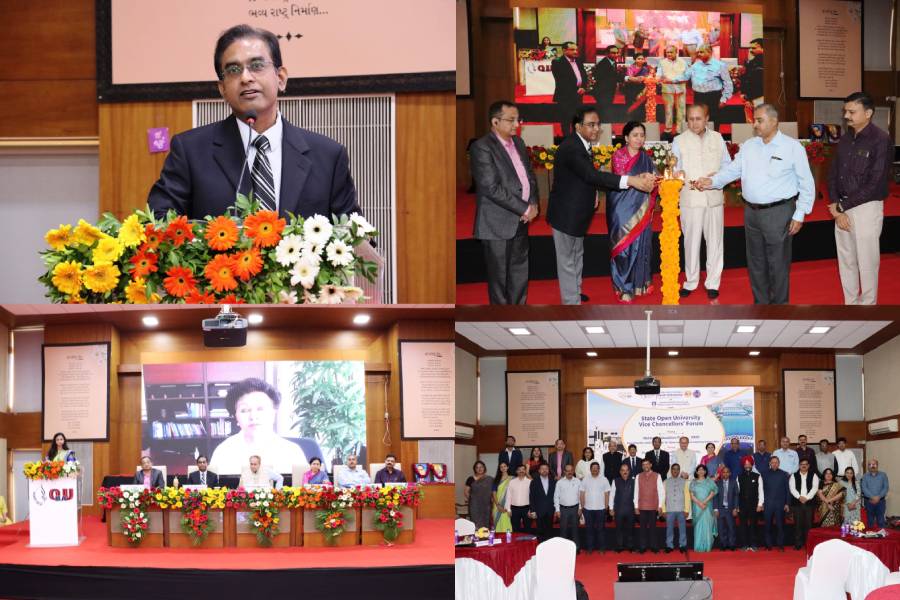Open University Vice Chancellors’ Forum: National Education Policy-2020: Opportunities and Challenges for Open and Distance Learning Universities
The Commonwealth Educational Media Centre for Asia (CEMCA), the regional centre of Commonwealth of Learning (COL), in collaboration with Dr. Babasaheb Ambedkar Open University (BAOU), organised the State Open University Vice-Chancellors' Forum on August 4 and 5, 2023, in Ahmedabad, Gujarat, India. The overarching theme of the event was "National Education Policy- 2020: Opportunities and Challenges for Open and Distance Learning Universities." The forum was graced by the presence of the 13 State Open University Vice Chancellors, the Vice Chancellor of Indira Gandhi National Open University, India, and several esteemed participants, including those from Malaysia, Mauritius, the United Kingdom, and the United Arab Emirates.
In the inaugural session, Prof. Dr. Ami Upadhyay, Vice Chancellor, BAOU, welcomed participants and described the forum's theme. She emphasised the significance of the event as a platform for sharing challenges, experiences, learnings, and best practices related to the ODL ecosystem. Dr. B. Shadrach, Director, CEMCA, briefly described the genesis of COL and CEMCA and their scope of work in his opening remarks. He highlighted the pivotal role that ODL and online and digital learning, in alignment with the National Education Policy 2020 (NEP 2020), would play in expanding higher education access and scale in India. He discussed how blended and HyFlex learning would help the Open Universities in realising the goals of the policy, including inclusive education for marginalised groups and lifelong learning.
Dr. Shadrach also proposed various possibilities for open universities to explore, such as overseas centres, credit transfer and joint programmes that would help in expanding their scope and scale of operations and add to their sustainability. He encouraged Vice Chancellors to lead the way and prepare resilient institutions, invest in tech enabled practices, equip teachers, enhance support systems for students, and excel in quality and innovative assessments and teaching methods. He also urged the participants to explore opportunities presented by new tech tools like Extended Reality and Generative AI.
Prof. Asha Kanwar, President and CEO of Commonwealth of Learning, Canada, addressed participants virtually and underlined that NEP 2020's goal of achieving increased access, equity, and inclusion in higher education could be possible only through ODL and online education. She mentioned that among the 33 open universities in the Commonwealth, 19 are in India, playing a significant role in enhancing the Gross Enrolment Ratio (GER) in higher education. As more and more conventional institutions are offering distance and blended learning in the post COVID era, the OUs have to maintain their niche and leadership position in the ODL space. Given the magnitude of challenges that lie ahead, the OUs need to pool their expertise and resources, and work towards a common goal. She concluded her speech by stating that in the past, OUs were struggling to achieve parity of esteem with campus institutions, now, the situation is perfect to seize the opportunity.
In his inaugural address, Prof. Nageshwar Rao, Vice Chancellor, Indira Gandhi National Open University (IGNOU), discussed the implementation of NEP-2020 in the last three years and congratulated the Team of BAOU for achieving the milestone of NAAC A++ grade in its very first cycle. He acknowledged that NEP 2020 offers several opportunities. It has taken the first step towards making ODL degrees equivalent to those offered by the conventional universities. He elaborated the specific advantages that the Open Universities have, such as providing affordable education, and their potential to increase the Gross Enrolment Ratio to 50 or more than 50 percent in India.
The forum included several plenary sessions and panel discussions around the theme. These sessions explored various aspects of the Open and Distance Learning (ODL) landscape, including reaching underserved learners, leveraging technology for enhanced ODL, implementing the Academic Bank of Credit (ABC), establishing the National Credit Framework (NCrF), addressing recognition and acceptance issues, promoting employability, and ensuring the resilience and sustainability of Open Universities. There was a special panel discussion on internationalising higher education through ODL, where participants from Malaysia, Mauritius, the United Kingdom, and the United Arab Emirates discussed strategies and the way forward.
The Valedictory Session featured a keynote address by Dr. B. Shadrach, who summarised the key insights and discussions that had transpired during the forum. Dr. Shadrach acknowledged that while NEP 2020 ushers in a wave of opportunities for Open and Distance Learning (ODL) universities, concerted efforts are necessary to effectively tackle the accompanying challenges. The Vice Chancellors and representatives from various ODL universities conveyed their commitment to adapting to the evolving educational landscape and actively contributing to the realisation of the policy's visionary objectives.
In her concluding remarks, Prof. Dr. Ami Upadhyay, emphasised that the Vice Chancellor's Forum had provided a thought-provoking platform for stakeholders to collectively contemplate the multifaceted opportunities and challenges presented by NEP 2020 for Open and Distance Learning Universities. The forum underscored the significance of fostering innovation, embracing adaptability, and fostering collaborative synergies to seamlessly integrate the policy's foundational principles into the operational fabric of ODL institutions. This, in turn, would pave the way for a more all- encompassing, flexible, and technologically-driven higher education ecosystem in India.


